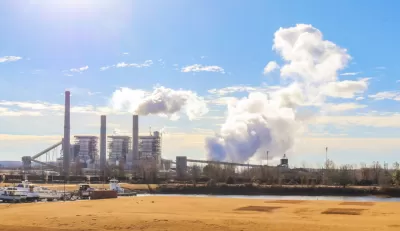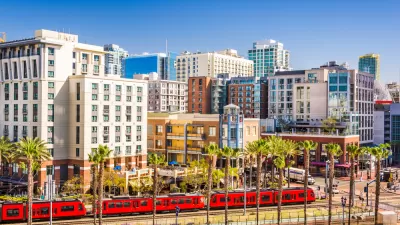The United States is making modest gains in the power and transportation sectors, but emissions in the industrial sector are holding steady, absent new reduction initiatives.

An annual report from Rhodium Group that analyzes trends in greenhouse gas emissions in the United States finds that “the US is on track to reduce emissions 24% to 35% below 2005 levels by 2030, absent any additional policy action,” far below the Paris Agreement goal of reducing GHG emissions by 50 to 52 percent. The report notes that “These estimates represent a rosier outlook for emissions reductions compared to Taking Stock 2021 (which estimated a 17-30% reduction by 2030 under current policy), but this change is largely attributable to slower macroeconomic growth projections and higher fossil fuel prices—not large policy changes.”
According to the report, “Industry becomes the largest-emitting sector absent meaningful policies to curtail emissions growth, with emissions remaining relatively flat depending on the scenario,” while the power sector continues to reduce emissions as more Americans turn to renewable energy and the transportation sector cuts some emissions thanks to electric vehicle adoption. “There has been some policy movement in the past year, although not close to the level of action required to meet the US’s 2030 climate target, and the recent Supreme Court ruling in West Virginia v. EPA has called EPA’s regulatory pathways into question.”
FULL STORY: Taking Stock 2022: US Greenhouse Gas Emissions Outlook in an Uncertain World

Maui's Vacation Rental Debate Turns Ugly
Verbal attacks, misinformation campaigns and fistfights plague a high-stakes debate to convert thousands of vacation rentals into long-term housing.

Planetizen Federal Action Tracker
A weekly monitor of how Trump’s orders and actions are impacting planners and planning in America.

In Urban Planning, AI Prompting Could be the New Design Thinking
Creativity has long been key to great urban design. What if we see AI as our new creative partner?

King County Supportive Housing Program Offers Hope for Unhoused Residents
The county is taking a ‘Housing First’ approach that prioritizes getting people into housing, then offering wraparound supportive services.

Researchers Use AI to Get Clearer Picture of US Housing
Analysts are using artificial intelligence to supercharge their research by allowing them to comb through data faster. Though these AI tools can be error prone, they save time and housing researchers are optimistic about the future.

Making Shared Micromobility More Inclusive
Cities and shared mobility system operators can do more to include people with disabilities in planning and operations, per a new report.
Urban Design for Planners 1: Software Tools
This six-course series explores essential urban design concepts using open source software and equips planners with the tools they need to participate fully in the urban design process.
Planning for Universal Design
Learn the tools for implementing Universal Design in planning regulations.
planning NEXT
Appalachian Highlands Housing Partners
Mpact (founded as Rail~Volution)
City of Camden Redevelopment Agency
City of Astoria
City of Portland
City of Laramie





























